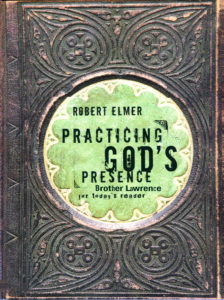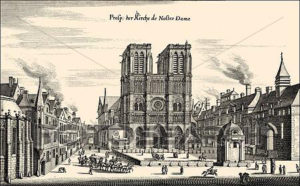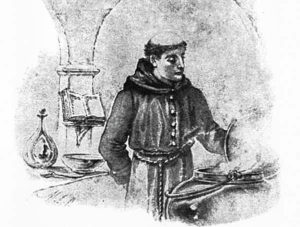In this age of spiritual seekers and restless pilgrims, it seems that many among us are on a journey, looking for meaning, purpose and passion in life. But we might do well to explore the path of a simple, uneducated monk from the 17th century, who found holiness and contentment in the ordinary, common “business of life.”
Nicolas Herman was born into a peasant family in a village in the Lorraine region of France in 1614. Poverty limited his educational opportunities and his options. Soon after joining the army mainly for the free meals, Nicolas incurred a serious leg injury in battle during what was later called ‘The Thirty Years War’, from which he never fully recovered. He then took a job as a footman to a well-known banker and treasury official in Paris, but experienced little success due to his own self-admitted clumsiness. Nicolas described himself in a letter as “a great awkward fellow who broke everything.”
The young man’s next move was to follow in the footsteps of his uncle, who had joined the holy Carmelite Order. Nicolas himself joined a Carmelite Priory in Paris as a lay brother at the age of 26 in 1640, taking the religious name Brother Lawrence, and in 1642 made his solemn profession of vows. He was assigned to the monastery kitchen, and for a number of years continued to struggle with feelings of unworthiness. But it was in the mundane daily reality of cooking, cleaning, chopping and scrubbing that he discovered a spiritual practice that would later become a source of healing and peace for generations of Christians around the world.
Despite his lowly position in the monastery kitchen and what many described as his “rough exterior”, Brother Lawrence slowly began to attract attention because of his reputation for his plain-spoken wisdom, common sense, warm hospitality, and above all else, his profound peace and joy. One person who regularly sought him out for conversation was Father Joseph de Beaufort, Vicar General of the Diocese.
Brother Lawrence’s leg injury eventually developed into painful chronic gout, but despite his suffering (or perhaps in part because of it) his profound sense of peace and intimacy with God grew. After serving for 15 years in the monastery kitchen, he was transferred to the sandal repair shop where he could at least sit down. Here he was in charge of maintaining over a hundred pairs of sandals for the other monks at the Carmelite monastery. He continued to be a bright light in his community and beyond, and many visitors – both learned people and common folks – sought him out for spiritual guidance.
When Brother Lawrence died in 1691 at the age of 77, well beyond average life expectancy at the time, Fr. de Beaufort wrote out many of the things he had learned from their conversations. These, along with a number of letters and spiritual ‘sayings’ written by Brother Lawrence, were published in 1692 in a book called The Practice of the Presence of God. It became a much-loved classic, crossing all denominational and cultural lines. In it, Fr. de Beaufort writes, “Brother Lawrence never really spent much time worrying about dying, or his sins, or heaven, or hell. He thought only about doing small things for the love of God, because the high-profile actions were beyond his reach. Then whatever happened to him was okay, because it was up to God in the end.”1
What was Brother Lawrence’s secret? Simply to make it his lifelong habit to continually seek rest in that place in his heart where the love of God resides.
In a letter to a good friend dated November 1685, he writes, “I don’t know of a better, sweeter life than an unbroken conversation with God, a life of unlimited free minutes with Him.”2 To another friend who was feeling overwhelmed and depressed, he gives this gentle advice, “We can remodel our hearts into chapels – the perfect place for a prayer retreat, where we can humbly and peacefully come to the Lord in love without a lot of show. Everyone can do it; some more, some less, of course. God knows.”3
This practice of having an “unbroken conversation with God” made even commonplace tasks in the monastery kitchen or sandal repair shop an opportunity to experience divine union, beauty and grace. And he loved to share that practice with others. In another letter to a struggling friend, he writes, “If we want to enjoy paradise-peace in this life, we have to get used to walking and talking with God. It’s a familiar walk, as with a friend.”4
 Can we practice the presence of God in our own kitchen? Perhaps not to the degree that Brother Lawrence experienced, but we can certainly give it a try – and hopefully it will spill over into the hearts and spirits of others. In mindfully enjoying the colours, smells, shapes and tastes around us with a grateful heart…in talking to God as we wash the dishes…in praying for our loved ones as we put together a salad…perhaps we too can find that place of rest. (Listening to Gregorian chant while you chop might help as well!)
Can we practice the presence of God in our own kitchen? Perhaps not to the degree that Brother Lawrence experienced, but we can certainly give it a try – and hopefully it will spill over into the hearts and spirits of others. In mindfully enjoying the colours, smells, shapes and tastes around us with a grateful heart…in talking to God as we wash the dishes…in praying for our loved ones as we put together a salad…perhaps we too can find that place of rest. (Listening to Gregorian chant while you chop might help as well!)
Preparing food and repairing sandals for his fellow monks became a loving act of connection for Brother Lawrence, linking the gifts of the earth and the work of his hands with the gift of friendship. This can be true for us as well.
I’ll never forget an experience when my husband and I were newly married, and also new to figuring out how to “live out” our faith. I was still attending university, and we moved into an apartment near the campus – and then began a search for a nearby church to attend. At one of the churches we visited, we sat beside a very friendly elderly couple. When they realized it was our first time at their church, they immediately invited us home for lunch. We were a bit taken aback, but spontaneously decided to accept the invitation. The couple then proceeded to invite some other young couples from the church for lunch as well, so that we could get to know some other people from the church. This all appeared to be a spur of the moment decision on their part, and I remember thinking, “Boy, I could never do that – invite all these people over for lunch without planning it first.” I knew our apartment was a mess, and I knew I had next to nothing in the fridge.
Well, guess what? This elderly couple’s small home was also rather a mess – but it was a very homey, inviting mess, that spoke of their lack of pretension. The meal? We and the other young couples were served peanut butter and honey sandwiches, happily prepared by our hosts in their tiny kitchen as their guests drank tea and chatted in the living room. The main course was followed by some rather sad looking popsicles that the elderly couple dug out of the bottom of their freezer…and then more tea. It was a wonderful afternoon.
That impromptu meal taught me a very important lesson that still serves me well. Hospitality is not really about the food or the decor; it’s about the attitude. And this beautiful couple, who became mentors to my husband and me for years to come, had an attitude of joy and humility. They also had the faith and courage to follow up on those little “nudges” from God, who asks us to trust Him with the details and be generous, as He is generous.
To quote Brother Lawrence once again: “Once and for all, we need to trust God and put our whole selves in His hands. He will never lead us wrong. We shouldn’t get tired of doing little things for God either, because God doesn’t care about the size of the task – only the love behind it.”5
 *Note: There are many translations of The Practice of the Presence of God into English from the original French, including some excellent recent versions. The quotes in this article are taken from a 2005 translation by Robert Elmer.
*Note: There are many translations of The Practice of the Presence of God into English from the original French, including some excellent recent versions. The quotes in this article are taken from a 2005 translation by Robert Elmer.
- Elmer, Robert; Practicing God’s Presence: Brother Lawrence for Today’s Reader (NavPress; Colorado Springs) 2005; pg. 26.
- Ibid; pg. 46
- Ibid; pg. 50
- Ibid; pg. 77
- Ibid; pg. 33










Pingback: The Presence of God | Curriculum of the Spiritual Life
Re: (Listening to Gregorian chant while you chop might help as well!). I tried the Gregorian chant but found myself massaging, stroking, and caressing the vegetables instead of chopping them.
P.S.: I’ve ordered Brother Lauwence’s book.